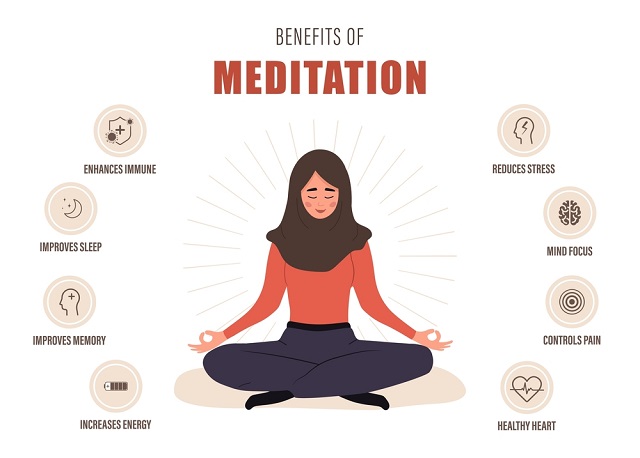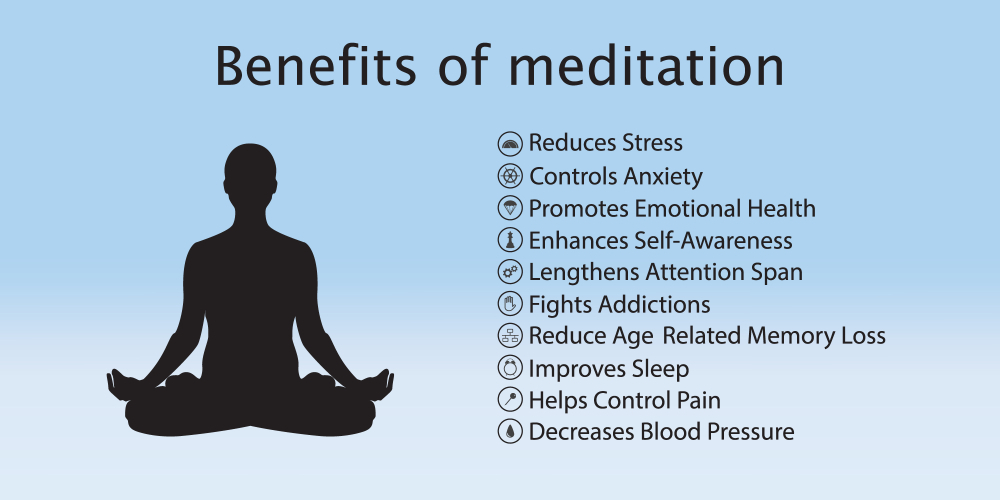The Astonishing Benefits of Meditation: The Science Behind a Calm Mind
In today’s fast-paced world, finding moments of calm amidst the chaos is more important than ever. The benefits of Meditation have long been hailed as a practice that cultivates a calm and focused mind. But did you know that it also has a multitude of astonishing benefits for your overall well-being?
In this article, we will delve into the science behind meditation and explore the many ways it can positively impact your mental and physical health. Whether you are a seasoned meditator or completely new to the practice, this article will provide valuable insights and inspire you to incorporate meditation into your daily routine. So, sit back, relax, and let’s explore the astonishing benefits of meditation together.
The Scientific Connection between Meditation and a Calm Mind
Meditation has been practiced for centuries, but it is only recently that science has started to uncover its true benefits. Numerous studies have shown a strong connection between meditation and a calm mind.
Impact of Meditation on the Brain
One of the key mechanisms behind this connection is the impact of meditation on the brain. Research has found that regular meditation can lead to structural changes in the brain, specifically in areas associated with attention and emotional regulation. These changes result in improved focus, reduced anxiety, and an overall sense of calm.
Reducing Symptoms of Depression and Anxiety
Meditation triggers the body’s relaxation response, effectively mitigating the physiological impacts of stress. It lowers blood pressure, reduces heart rate, and decreases the production of stress hormones. By regularly practicing meditation, you can train your body to respond more calmly to stressful situations in your daily life.
In the next section, we will explore further scientific evidence on how meditation positively affects mental health, including its role in reducing symptoms of depression and anxiety. Stay tuned for more astonishing benefits of meditation!

The Physical Health Benefits of Meditation
While meditation is widely recognized for its benefits to mental and emotional well-being, it also holds tremendous potential for improving our physical health. By taking a holistic approach to wellness, meditation can have a positive impact on various aspects of our physical well-being.
Numerous studies have linked regular meditation practice to a range of physical health benefits. For instance, research has shown that meditation can help lower blood pressure, reduce the risk of heart disease, and improve immune system function. Additionally, the practice has been found to alleviate chronic pain, enhance sleep quality, and even support weight management.
The science behind these physical health benefits lies in the mind-body connection that meditation cultivates. By calming the mind and reducing stress levels, meditation promotes relaxation and activates the body’s natural healing mechanisms. Moreover, the practice has been found to increase the release of endorphins, which are powerful natural painkillers and mood enhancers.
In the upcoming section, we will delve deeper into the scientific evidence supporting the physical health benefits of meditation. Furthermore, we will explore specific techniques and practices that can be incorporated into your daily routine to maximize these advantages. Get ready to unlock the transformative potential of meditation for your overall well-being. Stay tuned!
Improved Mental Health: The Key Benefit of Regular Meditation Practice
In recent years, there has been a growing body of scientific research highlighting the positive impact of meditation on mental health. One key benefit of regular meditation practice is its ability to reduce symptoms of depression and anxiety.
Studies have shown that meditation can increase levels of serotonin, a neurotransmitter responsible for regulating mood and emotions. By increasing serotonin levels, meditation can help alleviate feelings of sadness and anxiety, promoting a more positive and balanced mental state.
Furthermore, meditation has been found to activate the prefrontal cortex, the part of the brain responsible for decision-making and rational thinking. This activation leads to improved self-awareness and emotional regulation, allowing individuals to better manage their thoughts and emotions.
If you are experiencing symptoms of depression or anxiety, incorporating meditation into your daily routine may provide significant relief. By calming the mind and promoting a more positive outlook, meditation can be a valuable tool in supporting mental health and well-being.
In the upcoming section, we will delve deeper into the effects of meditation on stress reduction and overall emotional well-being. Get ready to discover how this ancient practice can transform your mental state and improve your overall quality of life. Stay tuned!
Enhancing Focus and Concentration through Meditation
In today’s fast-paced world, distractions are abundant, making it difficult to stay focused and maintain concentration. The constant barrage of notifications, emails, and social media updates can easily scatter our attention and hinder productivity. However, the practice of meditation provides a solution to this common challenge.
Neural Changes in the Brain During Meditation
Scientific research has revealed that regular meditation can significantly improve focus and concentration. During meditation, the brain undergoes changes in its neural connections, leading to improved cognitive function. Studies have shown that meditation increases the thickness of the prefrontal cortex and the anterior cingulate cortex, areas of the brain associated with attention and decision-making.
Enhancing Concentration Skills for Students and Professionals
By incorporating meditation into your daily routine, you can develop the ability to filter out distractions and regain control over your focus. Whether you’re a student needing to study for exams or a professional aiming to improve productivity at work, meditation can be a powerful tool to enhance your concentration skills.
In the next section, we will explore how meditation can positively impact physical health, including its role in reducing chronic pain and promoting better sleep. Stay tuned to uncover how meditation can benefit your overall well-being, both mentally and physically.

Meditation as a Stress Management Tool
Stress is an inevitable part of life, and in today’s hectic world, it seems like we are constantly bombarded with stressors. The good news is that meditation can serve as a powerful stress management tool, helping to create a calmer and more peaceful mind.
Numerous studies have shown that regular meditation practice can reduce the levels of stress hormones, such as cortisol, in the body. When we meditate, our brain shifts from the stress-induced fight-or-flight response to a more relaxed state. This shift activates the parasympathetic nervous system, responsible for promoting relaxation and reducing anxiety.
Not only does meditation help in the short term by calming the mind, but it also provides long-term benefits for overall stress management. With consistent practice, we can develop a heightened sense of self-awareness, which enables us to identify the early signs of stress and implement strategies to prevent it from escalating.
In the upcoming section, we will delve deeper into the science behind how meditation impacts stress levels and explore effective strategies for incorporating meditation into your daily routine. By adopting these proven techniques, you can equip yourself with the tools to navigate life’s challenges with a calmer and more resilient mindset. Stay tuned to unlock the secrets of meditation as a stress management tool.
Promoting Emotional Well-being through Mindfulness Meditation
Meditation has also been found to significantly enhance emotional well-being. The practice of mindfulness meditation, in particular, has been shown to have a profound impact on our emotional state.
Mindfulness Meditation
Mindfulness meditation involves cultivating a non-judgmental awareness of the present moment, including our thoughts, feelings, and bodily sensations. By intentionally focusing our attention on the present, without getting caught up in judgments or attachments, we create space for emotional clarity and peace.
Reducing Symptoms of Anxiety and Depression with Mindfulness Meditation
Research has demonstrated that regular mindfulness meditation reduces symptoms of anxiety and depression and increases feelings of happiness and contentment. This is because the practice helps us observe our emotions without getting overwhelmed by them, allowing us to respond to challenging situations with composure and equanimity.
In the next section, we will explore the science behind how mindfulness meditation influences our emotional well-being and discuss specific techniques that can be easily incorporated into your meditation practice. Get ready to embark on a journey towards greater emotional balance and resilience through the power of meditation.
Conclusion
The science is clear: meditation has remarkable benefits for both our mental and physical well-being. By practicing meditation regularly, we can lower blood pressure, reduce the risk of heart disease, enhance immune system function, alleviate chronic pain, improve sleep quality, and even support weight management.
These physical health benefits are not just coincidences; they are rooted in the mind-body connection that meditation fosters. Through calming the mind and reducing stress levels, meditation activates the body’s natural healing mechanisms and increases the release of endorphins, which are powerful painkillers and mood enhancers.
So, stay tuned and get ready to embark on a journey of self-discovery, well-being, and inner peace through the transformative power of meditation.







